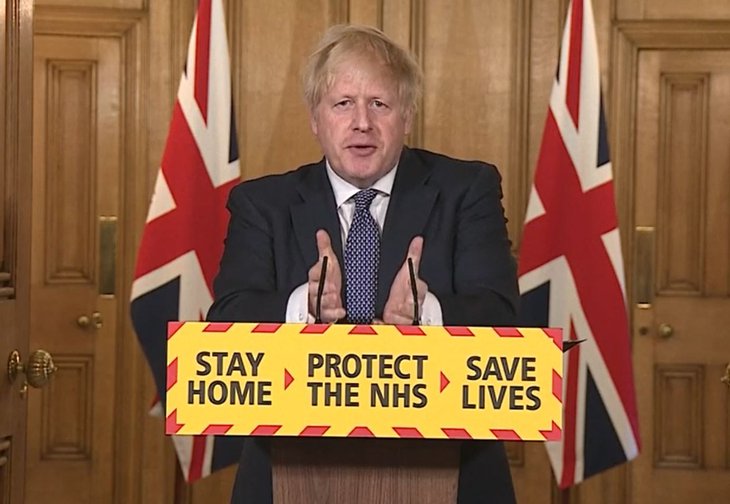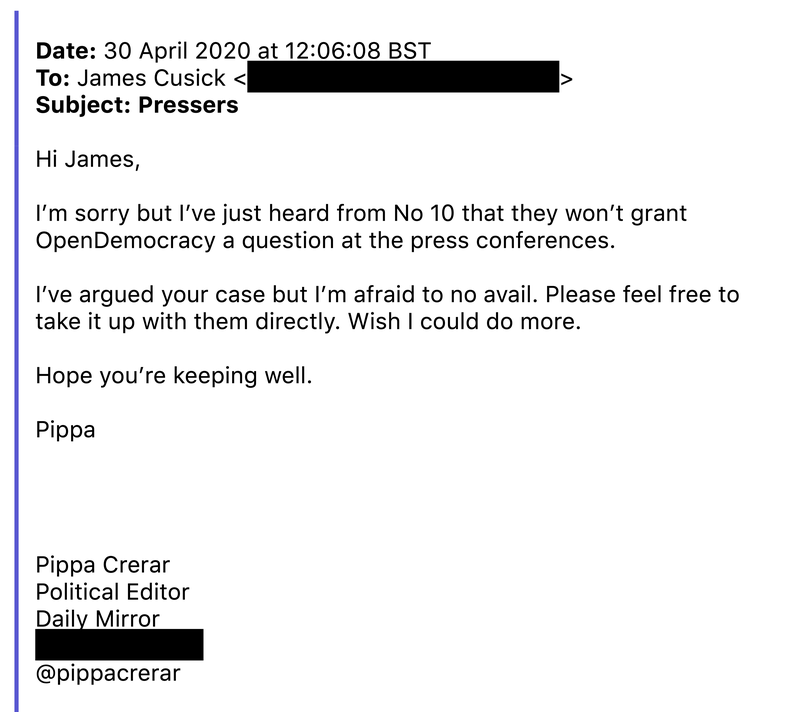
Downing Street condemned over ‘vindictive’ treatment of openDemocracy
Number 10’s ban on openDemocracy asking questions at COVID-19 briefings part of a “Trumpian” attack on press freedom, say free speech campaigners.
by Peter GeogheganA raft of leading national and international organisations who campaign for press freedom and transparency have condemned the British government’s “Trumpian tactics” to gag and exclude openDemocracy and other British media outlets.
Last week, we revealed that Downing Street had banned openDemocracy from asking direct questions about the government’s pandemic response during the daily televised briefing from Number 10. We now understand this was on the direct orders of Boris Johnson and Dominic Cummings.
Over the weekend, Number 10 sought to dismiss news stories about Boris Johnson’s senior adviser Dominic Cummings by saying they came from “campaigning newspapers” – the same language it had used to justify excluding openDemocracy from the televised daily COVID-19 press briefings.
Responding to openDemocracy’s exclusion, Michelle Stanistreet, general secretary of the National Union of Journalists, said the government’s exclusion of certain journalists and its blocking of some media outlets were “tactics deployed by repressive regimes – not the behaviour of a responsible democratic government”.
English PEN, a branch of the international association of writers, said Boris Johnson’s government was intentionally discrediting openDemocracy and other news outlets.
Reporters Without Borders warned that Downing Street’s “vindictive” response to media criticism of its handling of the pandemic meant press freedom in the UK was being eroded.
The pan-European press rights group Media Freedom Rapid Response (MFRR) said it was “deeply concerned” about the attacks on the UK media during the pandemic. And International Media Support (IMS), headquartered in Denmark, told openDemocracy that “worse was to come unless these early warnings about the erosion of press freedom in the UK are confronted and reversed”.
According to a Whitehall source, openDemocracy now understands that both Boris Johnson and his chief adviser, Dominic Cummings, specifically ordered that openDemocracy be kept away from the televised briefings.
openDemocracy journalist banned
The chair of the Lobby – the group of accredited political journalists who attend government briefings in Westminster – had been told openDemocracy’s “campaigning” credentials meant James Cusick, who represents openDemocracy in the lobby, would not be allocated a slot on the daily televised update of the virus given by ministers.

This is the first time that Cusick, who has worked in Westminster as a political journalist for The Independent, The Sunday Times and the BBC, and who has held a lobby pass for decades, has ever been formally excluded from a government briefing.
Over the weekend, following The Guardian and the Daily Mirror newspapers’ expose of Dominic Cummings rule-breaking 260-mile trip to Durham with his family in March, Number 10 issued a similar dismissal of their investigation.
Claiming the story was inaccurate, Downing Street said: “We will not waste our time answering a stream of false allegations about Mr Cummings from campaigning newspapers.”
Within two days, Dominic Cummings himself had confirmed that the core details of the Guardian and Mirror stories were true.
‘Alarmed’
Other media, including the BBC’s Today programme, Channel 4 News, The Sunday Times, and ITV’s Good Morning programme, have all been subjected to degrees of exclusion and vilification since Johnson became prime minister last year.
However there is no precedent for direct attacks on openDemocracy, The Guardian and the Daily Mirror as organisations whose questions should be ignored because they are “campaigning” news outlets.
Daniel Gorman, director of English PEN, told openDemocracy: “Free and unfettered access of the press is a key component of a democracy. As such, English PEN calls for openDemocracy to have restored access to ask questions in the televised COVID-19 briefings.
Gorman added that the government should “resist discrediting certain news outlets through the use of terminology such as ‘campaigning’ journalism”.
Rebecca Vincent, the UK bureau director of Reporters Without Borders, told openDemocracy she was “alarmed” by Downing Street’s dismissal of serious public interest reporting.
“These Trumpian tactics are only serving to fuel hostility and public distrust in media,” Vincent said. “These [decisions] must be immediately reversed before the UK’s press freedom climate is further eroded.”
Vincent said it was now time for Number 10 to reinstate the long-established person-to-person lobby briefings and “allow journalists to do their job unfettered”.
‘This has to stop’
Michelle Stanistreet, who as general secretary of the NUJ represents 30,000 journalists in the UK, echoed the widespread concern about Downing Street’s attitude towards the media.
“At a time of national crisis we need professional journalism and independent scrutiny more than ever,” she said. “Yet instead of supporting journalists and ensuring the public are properly served, Number 10 is engaging in petty efforts to limit scrutiny.
“Blocking a long-standing member of the lobby – James Cusick – from taking part in the daily briefings, for the crime of working for a ‘campaigning’ organisation – the same apparent slur levelled at the Guardian and Mirror for their revelations over Dominic Cummings’ lockdown breaches – is pathetic and demeans the officeholders responsible for these decisions.”
Stanistreet said the strategy of simply blocking media outlets was “not the behaviour of a democratic government” but was instead the “tactics deployed by repressive regimes”. She added: “This has to stop. Our government needs to ensure journalists can do their job freely and without political interference.”
This week the Society of Editors, whose 400 members are expected to uphold the right to freedom of expression in the UK news media and to promote the public’s right to know, wrote to the prime minister demanding assurances that the deployment of the phrase “campaigning” to describe media outlets, is not part of a wider campaign.
Ian Murray, the executive director of the society, said: “Number 10 appears to be deciding when it wishes to engage with a free media in this country and when it feels inconvenient to do that.”
Censorship warning
Media Freedom Rapid Response (MFRR), a mechanism to respond to threats to media freedom coordinated by the European Centre for Press and Media Freedom (ECPMF) based in Leipzig, told openDemocracy that the UK government had failed in its responsibility to keep the public informed. Nik Williams, MFRR coordinator, said bans and critical dismissals of ‘campaigning’ news outlets had “undermined the ability of the media to work free from threats and unjustified impediments”.
Speaking from Copenhagen, International Media Support said COVID-19 was a “stark reminder” that people need news they can trust.
It warned that in Spain during the early stages of the pandemic, the Spanish government tried to crack down on media reporting of its actions.
Journalists there were initially expected to merely send in questions, which were then vetted by the government. Effectively, the Spanish government was allowed to censor and exclude any journalist who was asking awkward questions. Only a coordinated campaign by 400 journalists halted the practice.
IMS told openDemocracy: “The actions of the British government to block public-interest media like openDemocracy from posing questions at press briefings is a warning of how even democratic governments can use this pandemic to censor free speech and quality journalism.
“Attempting to block openDemocracy, The Guardian and the Mirror, based on their status as ‘campaigning media’, flies in the face of public service values that the UK has long championed.”
openDemocracy asked Downing Street to comment on the exclusion from the televised briefings and also which campaigns – by openDemocracy, The Guardian and the Mirror – that it objected to. As of publication, no reply had been received.
Stop the secrecy: Publish the NHS COVID data deals
To: Matt Hancock, Secretary of State for Health and Social Care
We’re calling on you to immediately release details of the secret NHS data deals struck with private companies, to deliver the NHS COVID-19 datastore.
We, the public, deserve to know exactly how our personal information has been traded in this ‘unprecedented’ deal with US tech giants like Google, and firms linked to Donald Trump (Palantir) and Vote Leave (Faculty AI).
The COVID-19 datastore will hold private, personal information about every single one of us who relies on the NHS. We don’t want our personal data falling into the wrong hands.
And we don’t want private companies – many with poor reputations for protecting privacy – using it for their own commercial purposes, or to undermine the NHS.
The datastore could be an important tool in tackling the pandemic. But for it to be a success, the public has to be able to trust it.
Today, we urgently call on you to publish all the data-sharing agreements, data-impact assessments, and details of how the private companies stand to profit from their involvement.
The NHS is a precious public institution. Any involvement from private companies should be open to public scrutiny and debate. We need more transparency during this pandemic – not less.
By adding my name to this campaign, I authorise openDemocracy and Foxglove to keep me updated about their important work.